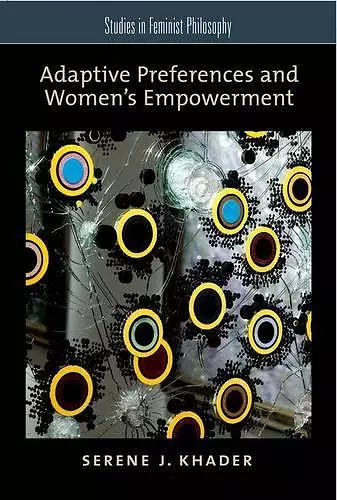Adaptive Preferences and Women's Empowerment
Format:Hardback
Publisher:Oxford University Press Inc
Published:13th Oct '11
Currently unavailable, and unfortunately no date known when it will be back

Women and other oppressed and deprived people sometimes collude with the forces that perpetuate injustice against them. Women's acceptance of their lesser claim on household resources like food, their positive attitudes toward clitoridectemy and infibulations, their acquiescence to violence at the hands of their husbands, and their sometimes fatalistic attitudes toward their own poverty or suffering are all examples of "adaptive preferences," wherein women participate in their own deprivation. Adaptive Preferences and Women's Empowerment offers a definition of adaptive preference and a moral framework for responding to adaptive preferences in development practice. Khader defines adaptive preferences as deficits in the capacity to lead a flourishing human life that are causally related to deprivation and argues that public institutions should conduct deliberative interventions to transform the adaptive preferences of deprived people. She insists that people with adaptive preferences can experience value distortion, but she explains how this fact does not undermine those people's claim to participate in designing development interventions that determine the course of their lives. Khader claims that adaptive preference identification requires a commitment to moral universalism, but this commitment need not be incompatible with a respect for culturally variant conceptions of the good. She illustrates her arguments with examples from real-world development practice. Khader's deliberative perfectionist approach moves us beyond apparent impasses in the debates about internalized oppression and autonomous agency, relativism and universalism, and feminism and multiculturalism.
Serene J. Khader offers a thorough, insightful, and well-constructed account of APs that offers a fresh perspective on this debate. ... Khaders book is very insightful, with clear definitions, and convincing argumentation. She advances greatly the philosophical conversation by offering a more nuanced version of APs and re-situating them in terms of flourishing rather than autonomy. Furthermore, her practical recommendations are especially promising for development practitioners. * Social Theory and Practice *
Filling an important gap in the literature, Serene J. Khader's first book deftly tackles a topic of growing importance as questions of individual human rights, agency and empowerment increasingly run up against questions of multiculturalism in development policy and pluralism in ethics ... this work makes an exhaustive analysis of a difficult and important problem, offering both practical and philosophical guidance for thinking about adaptive preferences. It is an important contribution to studies in which questions of multiculturalism and moral relativism complicate the search for answers. Khader's book also contributes to this discussion by reclaiming the dignity, empowerment, and sense of self-worth of individual women who exhibit inappropriately adaptive preferences, an important move in a discourse that ultimately seeks improvement of the human condition. * Stacy J. Kosko, Journal of Human Development and Capabilities *
ISBN: 9780199777884
Dimensions: 160mm x 236mm x 23mm
Weight: 499g
264 pages